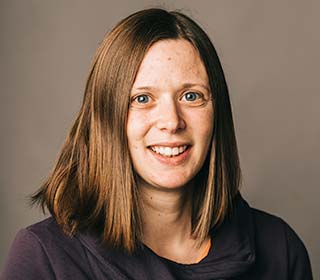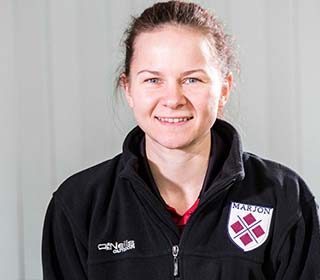MSc Sport Rehabilitation
You will develop your understanding of the principles, practices, and techniques involved in the assessment, treatment, and rehabilitation of musculoskeletal injuries through this BASRaT-accredited programme.

Entry requirements
A recent degree at 2:2 or above in a subject related to sport and health sciences.
Applicants with other relevant professional experience and/or qualifications such as the JSSERI will be considered on an individual basis.
Evidence of relevant industrial experience may be required to support applications.
Due to PSRB requirements, the Accreditation of Prior Learning (APL) is not accepted unless from another BASRaT-accredited programme.
UCAS code Apply to Marjon
UCAS institution code P63
Duration Two years part-time. Mandatory attendance 2 consecutive days per month plus online study equivalent to 2 days per week
Any questions about postgraduate study at Marjon?
Contact Rachel Bailey-Lewis, our Student Recruitment Officer (Postgraduate).
Course Summary
Our MSc Sport Rehabilitation has been designed to develop autonomous practitioners who can function as part of an interdisciplinary team across various sport, physical activity, and public health settings. It develops the five core competencies of a Graduate Sport Rehabilitator: Professional Responsibility and Development, Prevention, Recognition and Evaluation of the Individual, Management of the Individual – Therapeutic Intervention, Rehabilitation and Performance Enhancement, and Immediate Care.
You will apply your skills during clinical placement opportunities in a range of settings, such as Plymouth Argyle FC, Plymouth Patriots, Exeter Chiefs, the FA Women’s High-Performance Centre, Armed Forces partnerships and in our on-site Health and Wellbeing Clinics, accumulating more than 400 hours of experience. Additionally, you will have the opportunity to obtain an advanced trauma care qualification, endorsed by the Royal College of Surgeons Pre-Hospital Immediate Care.
Why this course at Marjon?
Blended learning approach allows you to combine digital learning with face-to-face practical teaching two days per month
On completion of this master’s you can apply for BASRaT accreditation as a Graduate Sport Rehabilitator
Acquire over 400 hours of clinical experience across a range of sport and health settings
Access to the latest technologies within world-class clinical and laboratory facilities
Established partners to gain clinical experience in sport and public health contexts
Specifically designed to enhance knowledge for individuals with a background in sport and health science
Modules for this course
Course Snapshot
“ I have been extremely impressed with the quality and standards of the resources available to the students and thus the marks reflect the students’ enthusiasm for the course which has been stimulated by the staff and resources, including support, available. ”
1st Year
Clinical treatment skills
Pathophysiology and clinical assessment
Fundamentals of exercise and rehabilitation
Research methods
Clinical experience
2nd Year
Applied functional rehabilitation
Professional practice
Research project
Current students say...
Carmen Ansley
“The transition to studying the Masters programme at Marjon has accelerated my learning and understanding of injury management and diagnosis. I have found all the lecturers are on hand to help develop practical skills by offering brilliant opportunities and links within the university and externally. The small focused lecture groups are perfect for a focused and driven individual, striving towards their future career.”
Arun Nair
“I chose this course to further my knowledge of rehabilitating injuries and manual therapy as well as learning new skills such as sports massage. The mix of theory, practical sessions and seminars is great for me because it helps to reinforce the theory and my understanding. I already feel that I have improved my knowledge of stretching and strengthening techniques as well as anatomical knowledge. So far it has been challenging but I have thoroughly enjoyed it and look forward to each lesson.”
This course is perfect if you're curious about
The science of sport rehabilitation
Injury prevention and management
Human anatomy and physiology
Evidence-based practice
Collaborative healthcare
Professional development
What might you become?
After obtaining the MSc in Sport Rehabilitation you will be eligible to register with the British Association of Sport Rehabilitators and Trainers (BASRaT) as a Graduate Sport Rehabilitator (GSR) and pursue a variety of career paths in the field of sports medicine and rehabilitation. As a sport rehabilitation specialist, graduates have gained employment in a variety of settings including professional sports (Plymouth Argyle FC, Torquay United FC, Exeter City FC, Plymouth Albion RFC, Exeter Chiefs RFC), Cornwall and Devon County Football Associations, amateur and semi-professional sports teams, private clinics, the armed forces, the NHS and charities such as the Firefighter’s Charity.
Accreditation

British Association of Sport Rehabilitators and Trainers (BASRaT)
BASRaT is the professional association and sole regulator for sport rehabilitation in the UK.
How you’ll be taught and assessed?
How will you be taught?
You will be taught through blended learning consisting of online delivery of live and pre-recorded sessions and learning tasks, with mandatory attendance two days per month on campus.
How will you be assessed?
Assessment methods are based on the practical competencies of a Graduate Sport Rehabilitator and appraises underpinning theoretical knowledge and critical thought. Assessment methods include a range of essays, written exams, case studies, clinical competency exams and critical appraisal on your performance on work placement.

Sarah has been employed as a full-time lecturer at Plymouth Marjon University since 2008. Following graduation from the University of Birmingham in 2007 with a BSc (Hons) Sports Therapy she trained as a Higher Education lecturer at the University of Wolverhampton. Sarah, as a Graduate Sport Rehabilitator, works closely with the accrediting body for the BSc (Hons) Sport Rehabilitation and Conditioning and MSc Sport Rehabilitation programmes, the British Association of Sport Rehabilitators and Trainers (BASRaT).
Fees and funding
Fees UK students: £8,500 for the full course
Fees for International students: £14,600
This fee covers your tuition and access to course-specific equipment and facilities, as well associated services including access to the library, study skills support, IT support, student support and wellbeing services and membership of the Student Union. There may be additional costs by course.
Funding available for this course
Our Student Funding Advisors offer confidential and impartial advice about your funding options.
Learn moreLecturers

Vicki specialises in exercise rehabilitation and has worked with diverse groups including adolescents, sports people, disabled athletes, fire service personnel and sarcoma patients. She currently leads the physical performance services for the FA Women's High Performance Centre.






